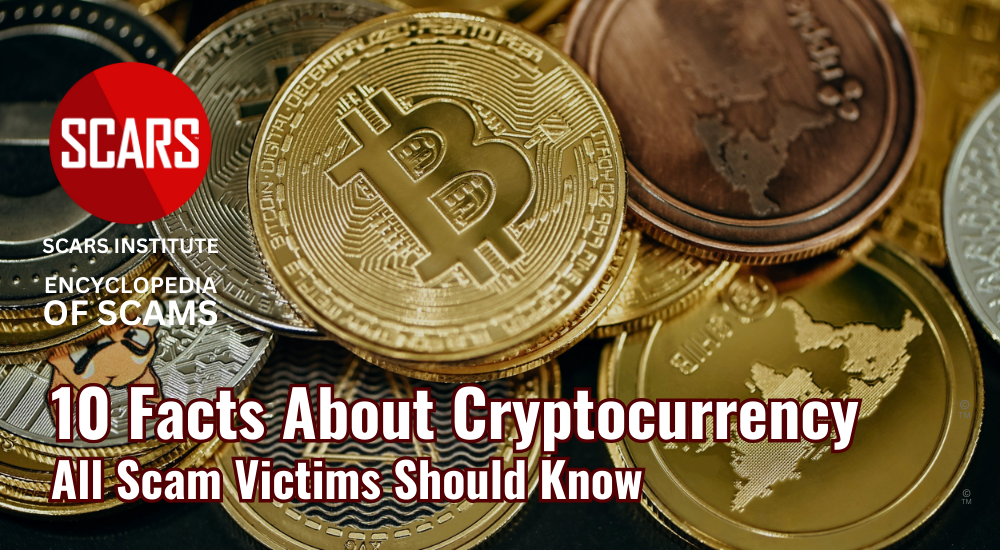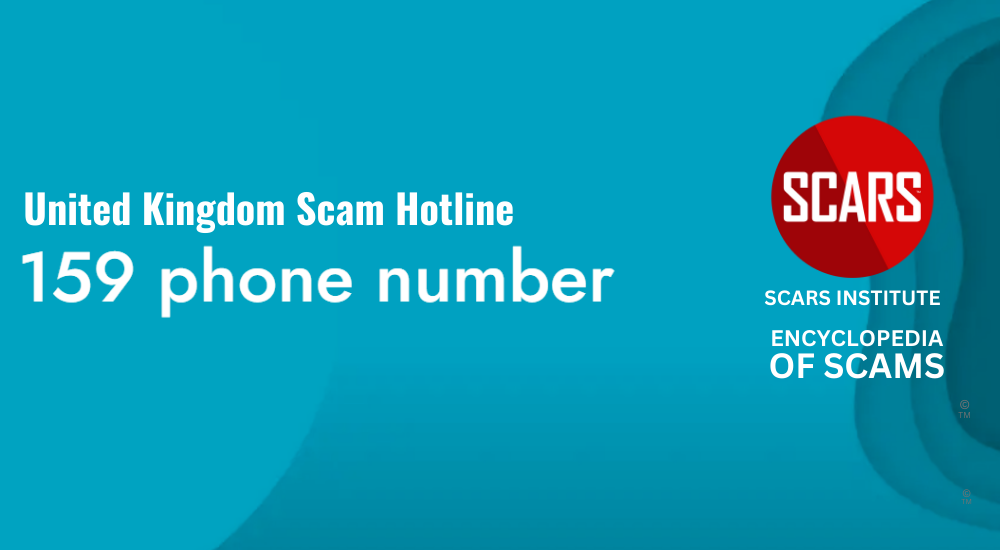
SCARS Institute’s Encyclopedia of Scams™ Published Continuously for 25 Years

UK 159 – Scam Hotline
Introducing 159: A Direct Line to Banking Security
Reporting and Stopping Scams – A SCARS Institute Insight
Author:
• SCARS Institute Encyclopedia of Scams Editorial Team – Society of Citizens Against Relationship Scams Inc.
Article Abstract
159 is a vital tool in the fight against financial fraud, providing UK consumers with a secure and direct way to contact their bank when faced with suspicious calls. By dialing 159, customers can bypass scammers and verify financial communications safely, as the number cannot be spoofed or impersonated. With over 800,000 calls made since its launch, 159 has proven its effectiveness and continues to expand, with efforts underway to make it a permanent, regulated service like 999 or 111.
The SCARS Institute advocates for the widespread use of 159 to protect consumers, emphasizing the importance of stopping, hanging up, and dialing 159 whenever an unexpected financial call raises suspicion. Awareness and action are key to preventing fraud, ensuring people stay informed and secure against evolving scams.

UK 159 – Scam Hotline
Introducing 159: A Direct Line to Banking Security
Financial scams continue to evolve, targeting consumers through phone calls that impersonate trusted banks and institutions. Recognizing the growing threat of fraudulent calls, the SCARS Institute is highlighting an essential tool in the fight against financial fraud: 159—a secure and easy-to-remember hotline that connects UK consumers directly to their bank, ensuring they can verify suspicious calls without falling into the trap of scammers.
Official 159 Website: https://stopscamsuk.org.uk/our-work/159-phone-number/
What is 159 and How Does It Work?
159 is a simple yet powerful initiative designed to protect consumers from phone-based financial fraud. If you receive an unexpected call about a financial matter—whether it’s a supposed fraud alert, a request for payment authorization, or a claim that your bank account has been compromised—you can hang up and dial 159 to be connected directly to your bank. This single-step action bypasses the risk of interacting with fraudsters, giving consumers a safe and verified route to their banking provider.
Unlike traditional customer service numbers, 159 cannot be spoofed or impersonated, making it a highly reliable tool against phone-based scams. Currently, 159 is supported by more than 99% of the UK’s retail banks, ensuring that nearly all consumers can access their financial institution securely through this service.
The Value of 159: A Proven Success
Since its launch as a pilot initiative, over 800,000 calls have been made to 159, helping prevent fraud and ensuring consumers can authenticate banking communications with confidence. It is an evolving service, with more banking institutions being added to the network. Currently, customers from banks including Barclays, HSBC, Lloyds Bank, NatWest, Santander, Monzo, Revolut, and many more can utilize 159 to connect securely.
The Future of 159: Expanding Protection
With its success, efforts are now underway to expand the reach and permanence of 159. The goal is to increase the number of participating financial institutions and to seek official recognition from Ofcom—the UK’s communications regulator—to designate 159 as a mandatory “Type A” service number, similar to emergency hotlines like 999 or 111. This step would solidify 159 as a permanent, trusted resource in consumer banking security, ensuring that no customer is left vulnerable to phone-based fraud.
Why 159 Matters
Financial fraud is an ever-growing concern, with criminals using increasingly sophisticated tactics to manipulate and deceive consumers. 159 serves as a critical line of defense, offering a direct, verified path to banks and reducing the risk of fraud losses. Instead of second-guessing whether a call is legitimate, consumers can take control by hanging up and dialing 159, ensuring they communicate only with their actual bank.
The SCARS Institute recognizes the importance of tools like 159 in strengthening consumer awareness and fraud prevention efforts. By spreading awareness of this service, SCARS aims to help consumers protect themselves from financial scams and reinforce the importance of verifying before trusting any financial request.
Stay Safe: Use 159 When in Doubt
If you ever receive an unexpected call about your finances—STOP, HANG UP, and DIAL 159. It’s a quick and effective way to confirm if the communication is real or a scam. As efforts continue to make 159 a permanent part of UK consumer protection, awareness, and usage of this service can help prevent thousands of scams and financial losses.
For more information on scam prevention and how to protect yourself from financial fraud, visit the SCARS Institute websites.
Stay informed. Stay safe. And always verify before you trust.
-/ 30 /-
What do you think about this?
Please share your thoughts in a comment below!
Table of Contents
LEAVE A COMMENT?
Thank you for your comment. You may receive an email to follow up. We never share your data with marketers.
Recent Comments
On Other Articles
- on Love Bombing And How Romance Scam Victims Are Forced To Feel: “I was love bombed to the point that I would do just about anything for the scammer(s). I was told…” Feb 11, 14:24
- on Dani Daniels (Kira Lee Orsag): Another Scammer’s Favorite: “You provide a valuable service! I wish more people knew about it!” Feb 10, 15:05
- on Danielle Delaunay/Danielle Genevieve – Stolen Identity/Stolen Photos – Impersonation Victim UPDATED 2024: “We highly recommend that you simply turn away form the scam and scammers, and focus on the development of a…” Feb 4, 19:47
- on The Art Of Deception: The Fundamental Principals Of Successful Deceptions – 2024: “I experienced many of the deceptive tactics that romance scammers use. I was told various stories of hardship and why…” Feb 4, 15:27
- on Danielle Delaunay/Danielle Genevieve – Stolen Identity/Stolen Photos – Impersonation Victim UPDATED 2024: “Yes, I’m in that exact situation also. “Danielle” has seriously scammed me for 3 years now. “She” (he) doesn’t know…” Feb 4, 14:58
- on An Essay on Justice and Money Recovery – 2026: “you are so right I accidentally clicked on online justice I signed an agreement for 12k upfront but cd only…” Feb 3, 08:16
- on The SCARS Institute Top 50 Celebrity Impersonation Scams – 2025: “Quora has had visits from scammers pretending to be Keanu Reeves and Paul McCartney in 2025 and 2026.” Jan 27, 17:45
- on Scam Victims Should Limit Their Exposure To Scam News & Scammer Photos: “I used to look at scammers photos all the time; however, I don’t feel the need to do it anymore.…” Jan 26, 23:19
- on After A Scam, No One Can Tell You How You Will React: “This article was very informative, my scams happened 5 years ago; however, l do remember several of those emotions and/or…” Jan 23, 17:17
- on Situational Awareness and How Trauma Makes Scam Victims Less Safe – 2024: “I need to be more observant and I am practicing situational awareness. I’m saving this article to remind me of…” Jan 21, 22:55
ARTICLE META
Important Information for New Scam Victims
- Please visit www.ScamVictimsSupport.org – a SCARS Website for New Scam Victims & Sextortion Victims
- Enroll in FREE SCARS Scam Survivor’s School now at www.SCARSeducation.org
- Please visit www.ScamPsychology.org – to more fully understand the psychological concepts involved in scams and scam victim recovery
If you are looking for local trauma counselors please visit counseling.AgainstScams.org or join SCARS for our counseling/therapy benefit: membership.AgainstScams.org
If you need to speak with someone now, you can dial 988 or find phone numbers for crisis hotlines all around the world here: www.opencounseling.com/suicide-hotlines
A Note About Labeling!
We often use the term ‘scam victim’ in our articles, but this is a convenience to help those searching for information in search engines like Google. It is just a convenience and has no deeper meaning. If you have come through such an experience, YOU are a Survivor! It was not your fault. You are not alone! Axios!
A Question of Trust
At the SCARS Institute, we invite you to do your own research on the topics we speak about and publish, Our team investigates the subject being discussed, especially when it comes to understanding the scam victims-survivors experience. You can do Google searches but in many cases, you will have to wade through scientific papers and studies. However, remember that biases and perspectives matter and influence the outcome. Regardless, we encourage you to explore these topics as thoroughly as you can for your own awareness.
Statement About Victim Blaming
SCARS Institute articles examine different aspects of the scam victim experience, as well as those who may have been secondary victims. This work focuses on understanding victimization through the science of victimology, including common psychological and behavioral responses. The purpose is to help victims and survivors understand why these crimes occurred, reduce shame and self-blame, strengthen recovery programs and victim opportunities, and lower the risk of future victimization.
At times, these discussions may sound uncomfortable, overwhelming, or may be mistaken for blame. They are not. Scam victims are never blamed. Our goal is to explain the mechanisms of deception and the human responses that scammers exploit, and the processes that occur after the scam ends, so victims can better understand what happened to them and why it felt convincing at the time, and what the path looks like going forward.
Articles that address the psychology, neurology, physiology, and other characteristics of scams and the victim experience recognize that all people share cognitive and emotional traits that can be manipulated under the right conditions. These characteristics are not flaws. They are normal human functions that criminals deliberately exploit. Victims typically have little awareness of these mechanisms while a scam is unfolding and a very limited ability to control them. Awareness often comes only after the harm has occurred.
By explaining these processes, these articles help victims make sense of their experiences, understand common post-scam reactions, and identify ways to protect themselves moving forward. This knowledge supports recovery by replacing confusion and self-blame with clarity, context, and self-compassion.
Additional educational material on these topics is available at ScamPsychology.org – ScamsNOW.com and other SCARS Institute websites.
Psychology Disclaimer:
All articles about psychology and the human brain on this website are for information & education only
The information provided in this article is intended for educational and self-help purposes only and should not be construed as a substitute for professional therapy or counseling.
While any self-help techniques outlined herein may be beneficial for scam victims seeking to recover from their experience and move towards recovery, it is important to consult with a qualified mental health professional before initiating any course of action. Each individual’s experience and needs are unique, and what works for one person may not be suitable for another.
Additionally, any approach may not be appropriate for individuals with certain pre-existing mental health conditions or trauma histories. It is advisable to seek guidance from a licensed therapist or counselor who can provide personalized support, guidance, and treatment tailored to your specific needs.
If you are experiencing significant distress or emotional difficulties related to a scam or other traumatic event, please consult your doctor or mental health provider for appropriate care and support.
Also read our SCARS Institute Statement about Professional Care for Scam Victims – click here to go to our ScamsNOW.com website.
















That’s wonderful news! When can we get something like that in the US?
We are working on it, but first we have to clean out the ridiculous Federal Funding so there is money for something really useful.